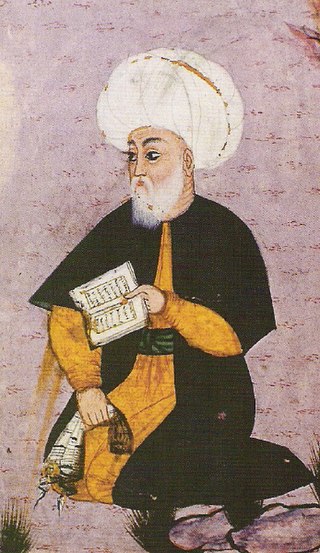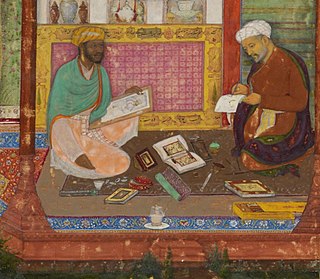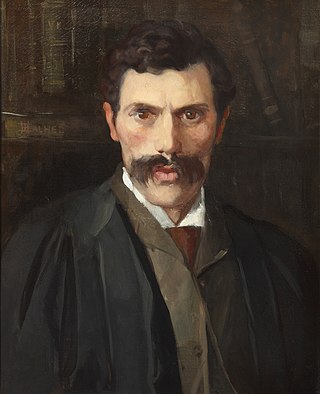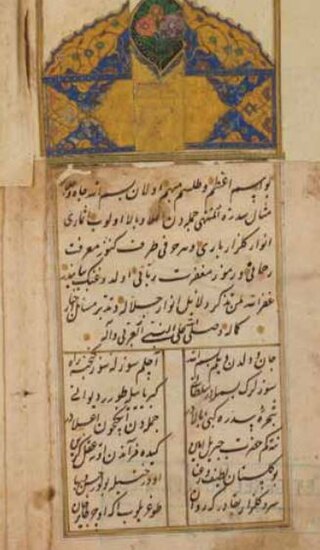Turkish literature comprises oral compositions and written texts in the Turkish language. The Ottoman form of Turkish, which forms the basis of much of the written corpus, was highly influenced by Persian and Arabic literature, and used the Ottoman Turkish alphabet.

Muhammad bin Suleyman, better known by his pen name Fuzuli, was a 16th-century poet who composed works in his native Azerbaijani, as well as Persian and Arabic. He is regarded as one of the greatest poets of Turkic literature and a prominent figure in both Azerbaijani and Ottoman literature. Fuzuli's work was widely known and admired throughout the Turkic cultural landscape from the 16th to the 19th centuries, with his fame reaching as far as Central Asia and India.

Sir Hamilton Alexander Rosskeen Gibb, known as H. A. R. Gibb, was a Scottish historian and Orientalist.

In Islamic cultures of the Middle East, North Africa, Sicily and South Asia, a Diwan is a collection of poems by one author, usually excluding his or her long poems (mathnawī).

David Samuel Margoliouth, FBA was an English orientalist. He was briefly active as a priest in the Church of England. He was Laudian Professor of Arabic at the University of Oxford from 1889 to 1937.
The poetry of the Ottoman Empire, or Ottoman Divan poetry, is little known outside modern Turkey, which forms the heartland of what was once the Ottoman Empire. It is, however, a rich and ancient poetic tradition that lasted for nearly 700 years, and one whose influence can still be felt in the modern Turkish poetic tradition.

Reynold Alleyne Nicholson, FBA, or R. A. Nicholson, was an eminent English orientalist, scholar of both Islamic literature and Islamic mysticism, and widely regarded as one of the greatest Rumi scholars and translators in the English language.
Sa'ad al-Din Masud ibn Umar ibn Abd Allah al-Taftazani also known as Al-Taftazani and Taftazani (1322–1390) was a Muslim Persian polymath.

Akshamsaddin, was an influential Ottoman Sunni Muslim scholar, poet, and mystic saint.

Yahya bey Dukagjini was an Albanian poet and military figure. He is known for his Ottoman Turkish diwan poems of the 16th century.

Pir Mehmed, better known as Aşık Çelebi, was an Ottoman biographer, poet, and translator. Born in Prizren, he served as kadi (judge) in many towns of the Rumelia. His major work Senses of Poets (Meşairü'ş-Şuara) of 1568 is of major importance.
Tezkire, from Arabic tadhkirah meaning "something that causes one to remember" or "memorandum", is a form of bibliographical dictionary or bibliographical compendium which flourished in the 16th-century Ottoman Empire. The most widely known are the tezkires of poets, but the books also focused on the works of government officials and artists in general. First seen in early Arab literature before the 10th century, they then made their way into Persian literature and later Ottoman literature.
Sehi Bey, (1471?–1548) was an Ottoman poet and bibliographer. He was the first one to compile a tezkire, a genre which would have many followers until the 19th century.
Ahdi of Baghdad (d.1593), also referred in Turkish as Bağdadlı Ahdi Ahmed Çelebi, was an Ottoman and Safavid era poet and bibliographer of the 16th century. He was one of the first four Ottoman poets to write a tezkire.
Latifî (1491–1582), or Kastamonulu Latifî Çelebi, was an Ottoman poet and bibliographer. Born in Kastamonu, in northern Anatolia, he became famous for his tezkireTezkiretü'ş-Şuara, the second Ottoman collection of bibliographical data on poets and poetry in overall.
Riyazi, also known as Riyazî Mehmet Efendi was an Ottoman poet and bibliographer. His Riyazü'ş Şuaratezkire, is the seventh of its kind in Ottoman history and is of great importance. Riyazi is considered the last of a group of bibliographers who tried to cover the entire field of Ottoman poetry.
İsa Necati, usually referred to as Necati or Nejati, was an Ottoman poet, and the first great lyric poet of Ottoman Turkish literature. Considered an original and eloquent poet, he won the praises of his contemporaries and later Turkish writers, securing for himself an important place in Turkish literary history.
The "E. J. W. Gibb Memorial" Series is an orientalist book series with important works of Persian, Turkish and Arab history, literature, philosophy and religion, including many works in English translation. Some works were included in the UNESCO Collection of Representative Works.

The Zennanname is a long form poem by Enderûnlu Fâzıl, completed in 1793. It categorizes and describes the positive and negative attributes of women from across the Ottoman Empire and the world according to their places of origin, in a masnavi form long poem in the Ottoman Dîvân tradition. The Zenanname is a sequel to the Hubanname (1792-3), an equivalent work on young men by the same author. Both works are in the şehrengiz style of the masnavi, a typology of poems describing the beauties of a city.

Shaukat Bukhari was a 17th-century poet who wrote in Persian.










